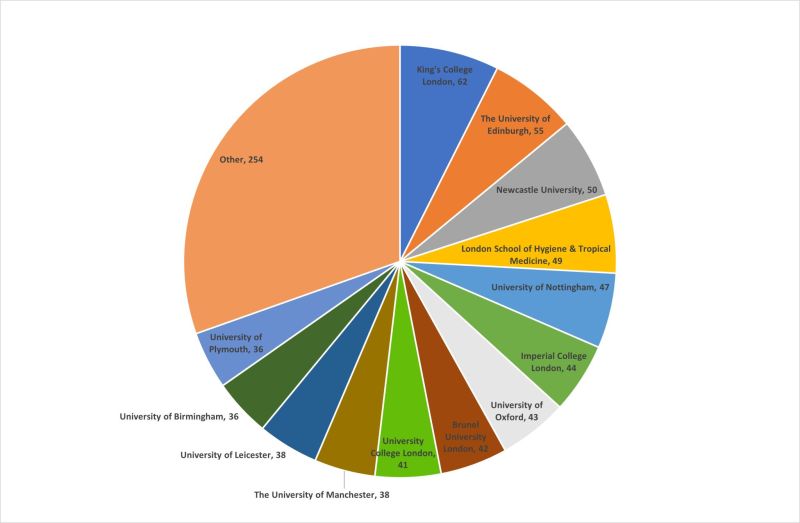The partnership between the University of Baghdad and the universities of the United Kingdom has been flourishing over the years. As stated, the joint research between the two parties has reached an impressive number of 835, all indexed by Scopus, which is one of the most reputable databases for academic research. This number highlights the extent of collaboration between the universities of the UK and the UOB, making the UK the third most significant partner for the University of Baghdad at the international level. The number of cumulative associated papers increased from 169 in 2010 to 801 in 2022. This considerable increase has been caused due to the high number of UOB faculty members who completed their postgraduate studies in the UK. The top-cooperating UK universities with the University of Baghdad, as mentioned, are King’s College London, The University of Edinburgh, Newcastle University, London School of Hygiene & Tropical Medicine, University of Nottingham, Imperial College London, University of Oxford, Brunel University London, University College London, The University of Manchester, University of Leicester, University of Birmingham, and University of Plymouth. These universities have shown a remarkable contribution to the research projects conducted between the universities, demonstrating the quality of education and research in the UK. Furthermore, the statistics provide a summary of the number of publications of each main research category that the UOB and UK universities are working together on. The data indicates that Medicine is the most researched field, with 228 joint research publications. This is followed by Engineering with 221 publications, Computer Sci. with 128, Biochemistry, Genetics, and Molecular Biology with 114, and Materials Science with 102 publications. The fields of Physics and Astronomy, Chemistry, and Dentistry have also shown significant contributions to the research collaborations, with 90, 83, and 69 publications, respectively. The data also reveals that the University of Baghdad and UK universities are researching a broad range of fields, including Mathematics, Agricultural and Biological Sciences, Chemical Engineering, Environmental Sci., Energy, Earth and Planetary Sciences, Immunology and Microbiology, Neuroscience, Pharmacology, Toxicology, and Pharmaceutics, and Social Sciences. This demonstrates the versatility and diversity of the research collaborations between the universities, which can contribute significantly to the advancement of science and knowledge. In the future, the partnership between the UK universities and the UOB is likely to continue to thrive and grow. This partnership provides significant opportunities for both parties to collaborate and produce high-quality research that can contribute to scientific advancements and knowledge.
اخبار ذات صلة
Comments are disabled.









